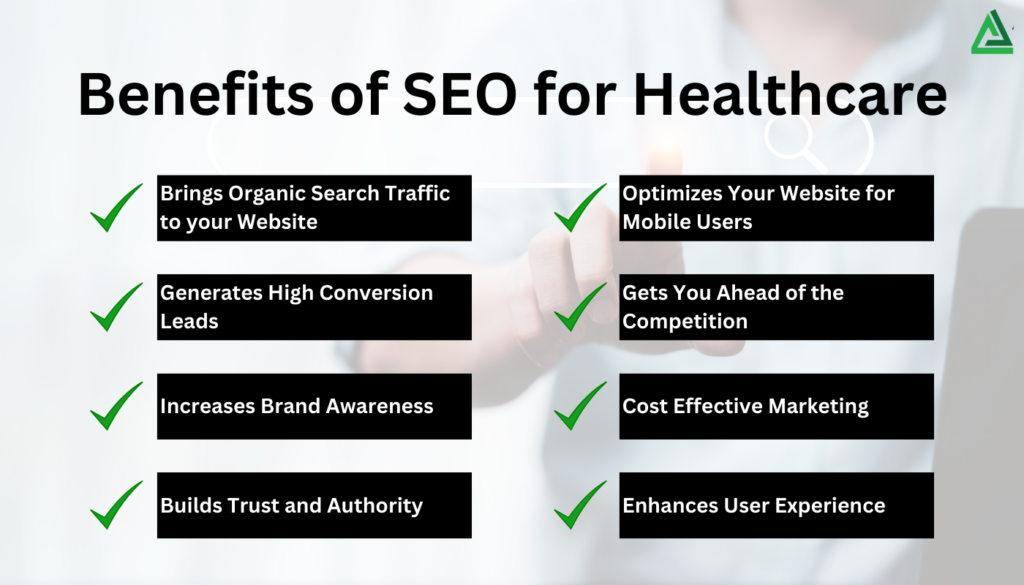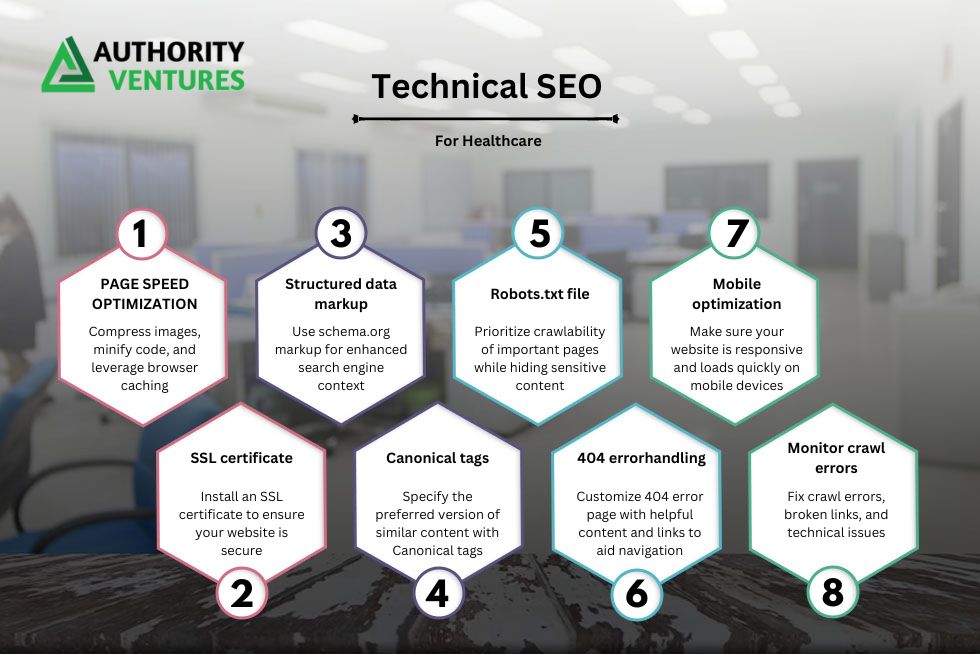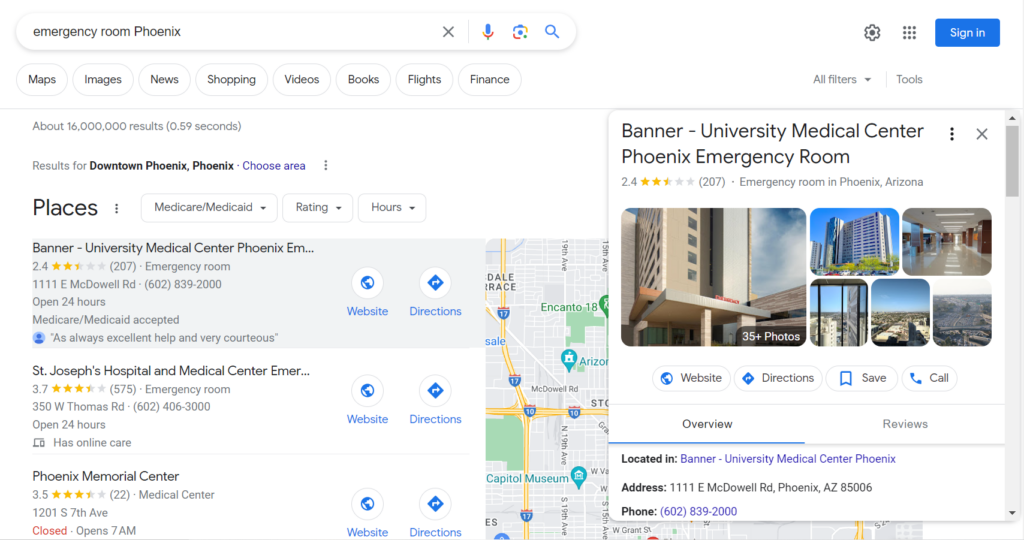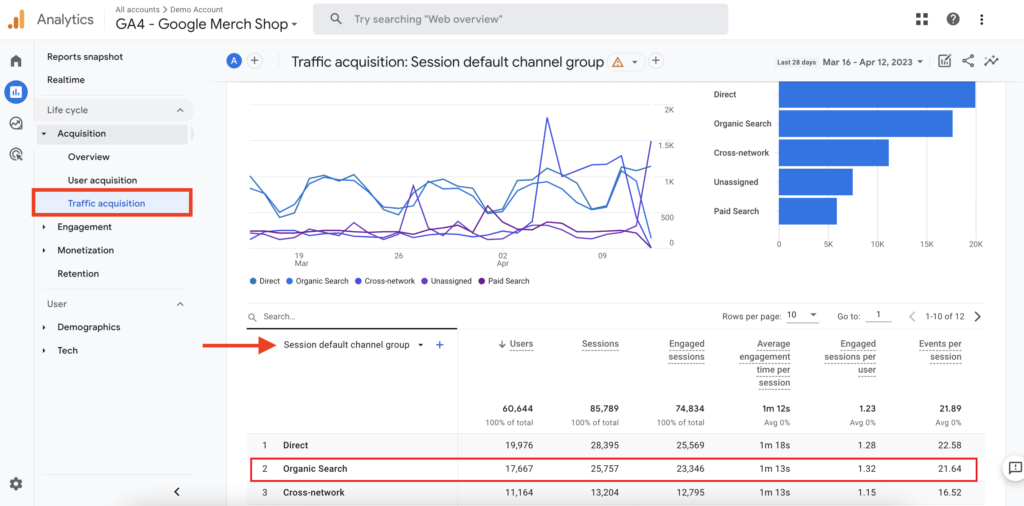In recent years, the healthcare industry has seen a significant shift towards online marketing to attract and retain patients. One essential aspect of attracting new patients for a medical practice is healthcare SEO (Search engine optimization). The more you increase your online visibility, the more chances you have to be found by patients who need your services.
In this article, I’ll help you understand what SEO in healthcare is, why it matters, and how to optimize your healthcare website for search engines. Apart from the basics, I’ll present you with some out-of-the-box ideas to help you beat your competition and steer ahead on search engine rankings. I’ll also touch the topics like tracking results and meeting organic traffic goals – all in the context of healthcare professionals.
This article will cover every essential step for an effective healthcare SEO strategy. We’ll try to break down the complex things into simple steps so that you are able to understand the concepts and even implement things at your end.
Hi. I’m Ajay Deep, a healthcare SEO expert with a total experience of 11+ years. I have worked with numerous medical professionals, multi-location clinics and hospitals. This article is a result of my extensive knowledge combined with my SEO experience in the healthcare industry.
Let’s begin!
Understanding Healthcare SEO
SEO for healthcare is a specialized form of search engine optimization that focuses on optimizing websites for the health and medical industry. The aim is to rank higher on Google and other search engines so that your practice appears on top when someone searches for a medical solution provider.
Over 90% of healthcare providers have a website (Source: 2021 Healthcare Digital Marketing Trends Report), but the majority of these websites are not optimized for search engines. Every new business in the healthcare industry wants new patients, from primary care doctors to multi-speciality hospitals; and dental clinics to laboratories. The best way to get there is via healthcare SEO. Apart from attracting more patients, SEO for healthcare professionals has many other benefits. Let’s understand what these might be.
Why SEO in Healthcare Matters
We have already learned in the above section that with the help of healthcare SEO, healthcare providers can increase their online visibility and attract more patients.
Apart from this, SEO for healthcare helps build trust and credibility for medical professionals and organizations. It helps you gain a competitive advantage over others and achieve cost-effective marketing that can last for years. All of this can ultimately drive better business outcomes for healthcare professionals and organizations

Developing a Healthcare SEO Strategy
From my experience of running a successful agency, I can tell you that in order to be successful in SEO, you need a good strategy. When it comes to the healthcare industry, your SEO strategy should focus on building a brand. If you are an individual, you need to build a personal brand; if you are an organization, you should focus on branding your organization name. I’ll explain it in the upcoming sections. But for now, let’s understand the basics first.
Keyword Research
Conducting in-depth keyword research is the first step in developing a healthcare SEO strategy. This will help you identify the keywords and phrases that are most likely to be used by potential patients when searching online for health services on the internet.
1. Start with Keyword Research Tools: Start by using keyword research tools such as Google Keyword Planner, Ubersuggest, and Moz Keyword Explorer to discover the most relevant and highest volume keywords related to your healthcare business.
You need to look out for two things while doing keyword research: the keyword volume and the keyword difficulty. Higher volume means more people search for that keyword. Greater keyword difficulty means ranking for that particular keyword is harder. The sweet spot will be identifying keywords with high search volume, high intent and low KD.
2. Analyze Your Competitors: Analyze the keywords your competitors are using to optimize their websites. This will give you an idea of what medical keywords are working for them and which ones you should target in your own healthcare SEO strategy. Some good tools that can help you with such kind of research are SEMrush and Ahrefs.
3. Use Long Tail Keywords: Long tail keywords are more specific phrases that usually have lower search volume but provide more targeted search engine results. These are an excellent way to capture leads and can be used in combination with the more general keywords.
From my experience doing SEO for healthcare clients, I can assure you that long-tail keywords generally have low KD and high intent. One example here can be that you might be a nephrologist, but people often search for “kidney stone doctor near me”.
4. Look for Local Keywords: If you serve a specific location, make sure to include local keywords in your keyword research. This will help you capture local searches and bring more local customers to your website.
On-Page SEO for Medical Websites
On-page SEO is the practice of optimizing web page content, meta tags, and internal links to improve search visibility. It includes optimizing a page’s content and HTML source code and focuses on helping search engines and users better understand the page’s content. On-page SEO has the power to bring new visitors to a website.

Here are some on-page SEO components for healthcare websites:
Content: Create high-quality content related to healthcare services while incorporating keywords related to the healthcare industry. Ensure your content is well-structured, easy to read, and addresses the user’s search intent.
Title Tags: Optimize title tags for each webpage by incorporating relevant keywords. Keep them concise (around 55-60 characters) and compelling to entice users to click. Include the primary keyword near the beginning of the title tag. The blog you are reading has the title “Healthcare SEO – A Definitive Guide To Rank Higher”. See how I used the keyword right at the beginning of the title.
Heading Tags: Structure your content with proper heading tags (H1, H2, H3, etc.) to indicate the hierarchy and relevance of the information. Include relevant keywords in headings to improve SEO.
Meta Descriptions: Craft unique and compelling meta descriptions for each webpage. They help a user understand what to find on a page and influence click-through rates. Include relevant keywords naturally, summarise the content briefly, and encourage users to click on the link.
URL Structure: Use descriptive and keyword-rich URLs for your web pages. Keep them short, readable, and relevant to the content.
Mobile-Friendly Design: Ensure your medical website is mobile-friendly and responsive. This is important as more than 60% of internet users access healthcare information and services through mobile devices. Responsive design improves user experience and can positively impact search rankings.
Page Speed Optimization: A good healthcare SEO practice requires your website to load as soon as possible. Improve page loading speed by compressing images, minimizing code, and leveraging browser caching. Faster loading speed for a website is a Google ranking factor.
Schema Markup: Implement schema markup to provide search engines with additional context about your content, such as healthcare services, doctors, reviews, and FAQs. Schema markup helps search engines understand and display relevant information in search results.
Off-Page SEO for Healthcare Industry
Off-page SEO is the third part of a comprehensive SEO strategy, building on the keyword research and on-page SEO work done in the previous sections.
Off-page SEO focuses on building relationships with other websites and increasing brand awareness. This includes activities such as link-building, social media outreach, and content marketing.

Link building: It is an important part of off-page SEO. By creating high-quality backlinks from authoritative websites, healthcare organizations can increase their search engine rankings and direct more organic search traffic to their website.
Social Media: Additionally, healthcare organizations should use social media platforms and create pages to engage potential patients. Healthcare organizations should also consider creating content calendars to bring traffic from social media channels and improve visibility.
Influencer Marketing: You might think that influencer marketing is meant for fashion and lifestyle brands. Well, let me tell you that you are wrong. I know a lot of dieticians, plastic surgeons and even primary care doctors who have got excellent results through healthcare influencer marketing.
The idea is to collaborate with influencers or healthcare professionals in your niche to promote your services or content. This can help expand your reach, increase brand awareness, and attract new patients.
Content Marketing and Guest Blogging: Create valuable and informative healthcare content that addresses the needs and concerns of your target audience. Publish blog articles, infographics, videos, or podcasts on your website and promote them through guest blogging on relevant websites. This can help establish you as an authority in the healthcare industry. Content marketing should be an essential part of your healthcare SEO campaign.
Online PR and Media Coverage: Reach out to local media outlets, healthcare publications, or industry influencers to share newsworthy stories or press releases related to your healthcare business. Media coverage and online PR help a lot when it comes to building authority for yourself as a professional or your business.
Technical SEO for Healthcare Sites
Technical SEO lays the groundwork for better search results. These are the basics I cover when optimizing a healthcare website for technical SEO.
Local SEO for Healthcare Businesses
Over 80% of healthcare-related searches are done with local intent (Source: Search Engine Journal). Understand it this way – If I live in San Fransisco and I search for “doctor for kidney stone”, the intent behind my search is that I need to consult a nephrologist in SF.
The components of local SEO for healthcare include:
Google My Business
GMB is an easy-to-use tool designed for business and medical practices. Healthcare providers can manage their online presence across Google, including Search and Maps. Simply put, it makes it easy for the patients to find you. From my experience, this is what makes a particular healthcare Google My Business profile list in the top-3 pack is:
- Location
- Verification
- Activity

Let’s break it down. If a patient types “Emergency room Pheonix” into Google, and you operate in that area. Also, you have a Google My Business account. Then, your practice has a chance to appear as a top listing. If your GMB profile isn’t verified, chances are you won’t appear in Google’s local pack.
A verified GMB account with updated information like correct name, phone number, working hours, location and photos, with a steady stream of reviews coming is what I call an SEO-optimized profile.
Online Directories and Listings
This is yet another important aspect of Healthcare SEO. Submit your healthcare business to relevant online directories and listings. You need to make sure that your business information, such as name, address, phone number (NAP), and website, is consistent across all platforms.
Listings in healthcare-specific directories, local directories, and platforms can enhance your online presence and improve local search visibility.
Online Reviews and Ratings
Encourage satisfied patients to leave positive reviews and ratings on platforms like Google, Yelp, Healthgrades, and other healthcare-specific review sites. Doing this will highly impact your healthcare SEO results and you may expect to become popular in your area.
Positive reviews influence potential patients and contribute to your online reputation and credibility. Respond to positive and negative reviews to show your commitment to patient satisfaction.
Advanced SEO Factors for Medical Industry
Google YMYL
Google “Your Money or Your Life”.
These pages cover topics that can impact a person’s health, happiness, or financial well-being. For medical websites, any advice that you give to patients through your website pages falls under the YMYL category. Google recognizes the criticality when it comes to health-related content.
Google EEAT
Experience, Expertise, Authoritativeness, Trustworthiness
Google cares about ensuring that users have access to high-quality and credible medical information. Google assesses these factors to determine the reliability and credibility of medical content. So, it’s crucial to exhibit experience, establish your expertise, showcase your authority, and build trust with your audience.
Tips for Healthcare SEO
Working with healthcare practitioners as their SEO expert for over a decade, I have gained some industry-specific tips. I am happy to share these here.
Start a blog: Create a blog on your medical website to regularly publish informative and educational content. This helps establish you as an authority in your field, attracts organic traffic, and provides opportunities for internal linking and keyword optimization.
Use real images on the website: Put some real images of your staff, faculty, infrastructure and even yourself on your website. Authentic visuals can enhance credibility and trustworthiness, making a positive impression on potential patients. This is one of the most under rated healthcare SEO practise, but, believe me, it has a huge impact overall.
Post weekly on Google My Business: As for the healthcare sector, GMB needs to be kept active. Update your GMB with some fresh content, such as news, announcements, or offers.
Leverage Social Media: Your patients (safe to say everybody) uses one or other social media channels. Facebook, Instagram, and Tiktok are great places to connect with your audience. Engage in conversations and share valuable health-related content.
Common Mistakes in Healthcare SEO
While we are at it, let me also share insights on common mistakes in SEO healthcare and how to avoid them:
Use of jargon: Healthcare practitioners tend to use a lot of medical jargon in their content. As a healthcare professional, it may seem natural to you. But can confuse and alienate your target audience. Use easy and clear language that can be easily understood by your patients.
Missing local keywords: Neglecting local keywords is a missed opportunity for healthcare providers. As per Google, 46% of all searches have local intent. Location-specific keywords will help patients within your geographical area find you.
Not focusing on building authority: Again, healthcare is strictly a YMYL category. It is crucial for you to establish authority. Create content that showcases expertise, research-backed information, and contributions to the medical field. This builds trust with both users and search engines.
Not having a strategy: Not only SEO but starting anything without a plan is a recipe for disaster. Craft a data-backed SEO plan. You may need to contact an SEO expert here. But before you start with your healthcare SEO efforts, you need to define your target audience, set specific goals, and develop a complete plan to optimize your website and content effectively.
Use of AI in Healthcare SEO
Keyword Research: AI-powered tools are taking keyword research to the next level. They can analyze vast amounts of data, including user search patterns, to identify the most relevant keywords for healthcare websites. By using AI, healthcare SEO professionals can discover hidden keywords and optimize content to reach the right audience.
Topic Ideas: Coming up with engaging content topics becomes a challenge after some time. That’s where AI steps in! With AI-powered tools, you can generate heaps of topic ideas tailored to your target audience.
Write Social Media Posts: Some medical professionals find social media quite enigmatic. There are many AI-powered content generation platforms available nowadays. They can craft compelling captions, and even provide hashtag recommendations for your social media pages.
Generate Google review replies: AI can assist in generating personalized and contextually appropriate responses to Google reviews. By utilizing natural language processing (NLP) algorithms, AI tools can analyze the sentiment, context, and content of reviews and provide suggested replies that effectively address the reviewer’s concerns.
How to Measure Healthcare SEO Results
It would be nice to see your website on the top after you have put in all your efforts in optimizing. But it will get there eventually. As I say to all my clients, SEO takes time. Still, there is no reason for you to not see what results your SEO efforts are yielding. (These are some of my favorite tools.)
Keep an eye on your website analytics: Google Analytics is a great place to start. Simply connect it to your website to track your website performance.

You can measure
- Website Traffic
- Organic Traffic
- Engagement
- Session Duration
- Conversions
Monitor your keyword rankings: Tools such as Moz, SEMrush, or Ahrefs can help you keep tabs on how well your medical website ranks for the healthcare keywords you’re targeting. Regularly check your keyword rankings to see if they’re improving or declining, which can tell you a lot about the impact of your SEO work.
Analyse your website’s backlink profile: Backlinks are important for healthcare SEO. Monitor for both the number and quality of backlinks. My go-to tools for backlinks are Ahrefs, Moz and Majestic.
Track social media mentions and reviews: By tracking these KPIs with Google Analytics 4 and Google Search Console, businesses can learn which content their audience engages with and make sure their SEO efforts are successful.
Remember, SEO takes time and consistent effort.
Medical SEO (Extended)
Dig deeper into healthcare specializations and see for yourself how SEO can help you get more patient appointments. Choose your specialization below.
FAQs on Healthcare SEO
Healthcare SEO can help your practice increase search engine traffic and attract more potential patients through organic search engine rankings. By optimizing your website and content for relevant keywords, you can increase visibility in search engine results and reach a wider audience.
The timeframe to see results depends on the competitiveness of your industry and the quality of your optimization efforts. Generally, it can take several months before you start to see measurable results.
A good medical SEO strategy includes optimizing your website for relevant keywords, creating high-quality content, building links to your website, and monitoring your organic search performance. Additionally, you should ensure that your website is mobile-friendly and able to be easily accessed on different devices.
SEO agencies generally have pricing plans that start from as low as $100 per month. However, the plans depend on the number of keywords you want to rank for. For example, a plan of $100 per month will give you 1 keyword and a plan of $300 per month will give you 5 keywords. These are just rough ideas. The pricing varies from agency to agency. The pricing may also depend on the type of services required and your geographical location.
If you want to hire a professional healthcare SEO agency, you may book a call with us here. We promise that you’ll gain a lot during this call.
The healthcare sector has seen the most advancement in digital space during the COVID pandemic. Even when the pandemic is over, this trend is nowhere near stopping. AI, machine learning and voice search are the centres of future developments in SEO for healthcare.
Healthcare SEO requires a deep understanding of medical terminology. Every step should adhere to compliance with medical regulations. Furthermore, SEO in medical fields is most effective if it scores well for Google EEAT and YMYL. In short, healthcare SEO requires a tailored approach.
HIPAA requires medical services to handle all patient information with care. The same applies to SEO services dealing with healthcare. It’s important to avoid including patient identifiers in metadata, URLs, or visible content.
Search engines prioritize websites that provide a positive user experience. It indicates relevance and value to visitors. A thoughtfully designed healthcare website has intuitive navigation and informational content. This reduces bounce rate and enhances engagement.



